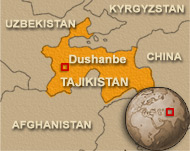OSCE: Tajik, Kyrgyz polls unfair
Pro-government forces were out to dominate parliaments in Kyrgyzstan and Tajikistan after weekend elections in both Central Asian countries, seen as a failed test in democracy by Western observers.

As first results emerged there was little sign that nascent opposition forces would increase their small parliamentary presences in the two countries, where the authorities have had little time for democratic criticism since the collapse of Soviet rule in 1991.
Muhiddin Kubri, spokesman for the opposition Islamic Nahda Party in Tajikistan, cast doubt on the credibility of the parliamentary elections in the country. Speaking to Aljazeera, he said the election process was flawed and rigged.
The opposition was vocal in both countries before the vote, with roads blocked in Kyrgyzstan after its party leaders were removed from the voting lists.
But preliminary results in Kyrgyzstan gave opposition members only three out of the 28 seats in parliament.
Another Ukraine?
In Tajikistan, the party supporting President Emomali Rakhmonov won 80% of the vote on 88% reported voter turnout.
Both countries’ elections were slammed by the Western-led Organisation for Security and Cooperation in Europe (OSCE), which personally criticised Kyrgyz President Askar Akayev for warning of possible civil war in the event of popular uprisings of the kind that recently ousted Ukraine and Georgia’s post-Soviet old guard leaders.
 |
|
Democracy has been stifled since |
The Kyrgyz election “was undermined throughout the country” by problems such as vote-buying, violations of freedom of the media, and disqualifications of candidates, Kimmo Kiljunen, head of the OSCE observers, said.
A demonstration by activists in a park in Kyrgyzstan’s capital Bishkek attracted around 300 people waving yellow and pink banners – colours that some opposition figures have said might come to be associated with a Ukraine-style “tulip revolution”.
With second-round voting to take place in more than half of Kyrgyzstan’s 75 constituencies however, it was unclear whether they might be a continuation of public unrest in far-flung regions that led to fresh polls being ordered in two constituencies for 13 March.
Unfair polls
The government’s win in Tajikistan followed the president’s recent constitutional changes allowing him to stand again for up to two seven-year terms starting in 2007.
In Kyrgyzstan, there was disappointment among Western groups and embassies promoting democracy, a representative of one such organisation said.
 |
|
The CIS clashed with the OSCE |
“There’ll be disappointment among organisations that the country wasn’t able to move forward very aggressively,” the representative said, requesting anonymity. “These last two weeks you saw a lot of things that didn’t seem to be designed to curry international favour.”
Amid downbeat reactions from Western representatives and bad-tempered exchanges between the Kyrgyz authorities and the US embassy over the pre-election period, the reaction was altogether sunnier from the Moscow-backed Commonwealth of Independent States (CIS).
The US-backed introduction of indelible ink for marking Kyrgyz voters’s fingers to stop them voting more than once was one of the few things criticised by observers from the CIS, which has consistently sparred with the OSCE over standards of elections in former Soviet republics.
The ink “held up the process” in an election that was otherwise “legitimate, free and open,” Asan Kozhakov, a leading member of the CIS team, told journalists.